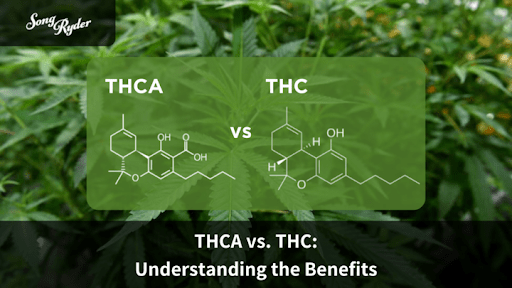
THCA vs. THC: Understanding the Benefits
Share
Cannabis is a powerful plant with many natural compounds that offer unique wellness benefits. Two of them that are most popular are THCA (tetrahydrocannabinolic acid) and THC (tetrahydrocannabinol). As cannabis becomes more common in the commercial marketplace, with a variety of products available for shoppers to explore, understanding the differences between THCA and THC is important for making informed choices.
This blog will explore how THCA and THC work, their unique benefits, and how they can support overall well-being. Let's get started!
What is THCA?
THCA, an abbreviation for tetrahydrocannabinolic acid, is a cannabinoid found naturally in the trichomes of fresh cannabis plants. Raw, unheated cannabis contains an abundance of THCA. It is non-psychotropic, meaning it does not produce the "high" as cannabis does. THCA is also the precursor to THC (tetrahydrocannabinol), or we can say THC is borne from it when exposed to heat.
THCA is available as raw hemp products, such as tinctures or hemp flowers. It is known to have anti-inflammatory benefits, but more research is needed to substantiate this.
Decarboxylation of THCA to THC
It is a process that converts THCA into THC. When the THCA hemp flower trichomes or harvested plant are heated through any medium, whether smoking, vaping, or cooking, THCA loses a carboxyl group and turns into THC. This process may also occur naturally when the plant ages or is exposed to sunlight or environmental factors for a long time. However, this conversion process is slower than when heat is applied intentionally.
What is THC?
Tetrahydrocannabinol (THC) is a psychotropic compound in cannabis. It is formed when THCA undergoes decarboxylation, as discussed earlier. THC is known for its robust effects, such as euphoria and relaxation. Beyond its psychotropic properties, THC is also believed to offer therapeutic benefits, including pain relief. However, research on THC is ongoing, and its full range of effects and benefits are still being investigated.
Breaking Down the Difference Between THC and THCA
THCA and THC may seem like two related cannabinoids, but their differences make them completely different entities. Let's explore their differences to bring more clarity.
1) Chemical composition
THCA (C₂₂H₃₀O₄) contains an additional carboxyl group (-COOH) in its molecular structure than THC, which makes it a large and non-psychotropic molecule and alters its properties. On the other hand, THC is the decarboxylated form of THCA, where the carboxyl group is removed, which alters the compound’s structure and enhances its psychotropic effects.
2) Properties
THCA does not produce the intense effects commonly associated with cannabis. When taken in its raw form, its large structure prevents intense interaction and getting high. THC, on the other hand, may have psychotropic properties and leave strong effects. However, these effects vary with individuals.
3) Intake Method and Effects
The effects of THCA and THC vary with the method of intake. If you want to experience pure THCA products minus the psychotropic effects, you have options like raw hemp flowers (which can be chewed or added to meals), tinctures, and other non-heated preparations. THCA joints, however, require heating, which converts THCA into THC and delivers a psychotropic experience. THC products, such as Delta-8 THC pre-ground flower, joints, vapes, and edibles, are available for those seeking a more traditional cannabis experience.
4) Efficacy
THCA and THC offer distinct wellness benefits, each with its unique profile. THCA, a non-psychotropic cannabinoid, is known for its potential anti-inflammatory and antioxidant properties, which makes it a promising option for those seeking a milder experience. In contrast, THC provides well-rounded and stronger wellness benefits, which may include pain relief and nausea suppression. It is an effective option for many cannabis shoppers. However, remember that individual experiences may differ. When choosing between these two, assess your wellness needs and make the right choice.
5) Legal Status
THCA is legal in many places because it is non-psychotropic and not classified as a controlled substance. However, local regulations may still apply. THC, on the other hand, is more strictly regulated. The legality of THC varies significantly across states and countries. Some allow it for medical or recreational use, while others prohibit it entirely. In the United States, cannabis laws depend on individual state regulations, so it is essential to stay informed. Additionally, product quality and THC content can vary based on location and legal restrictions, so check those before purchasing.
The legality of THC varies significantly across the United States. Some states allow its use for medical or recreational purposes, while others prohibit it entirely. Thus, you should be aware of state laws specific to your area.
THCA and THC Benefits for Wellness
Both THCA and THC have shown potential wellness benefits. Research suggests that THCA may possess anti-inflammatory properties, while THC may offer pain relief and other therapeutic effects. However, it's crucial to remember that research into both compounds is ongoing, and more studies are needed to understand their mechanisms of action and potential benefits.
THCA vs THC: Which One You Should Prefer?
When deciding between THCA and THC, carefully consider your individual needs and choose the option that best suits you. Consult a healthcare provider if you have any medical conditions or are taking medications. They can help you determine the best possibility and offer personalized suggestions. Also, be sure to research the effects and legal status of THCA and THC in your area to make an informed decision.
At Song Ryder, we offer comprehensive hemp products that cater to the specific needs of our customers. From the finest CBD hemp flower to a wide Delta-8 THC variety, we offer numerous options for exploring the best hemp properties. Visit our website to check our product offerings.
Frequently Asked Questions
1) Is THCA legal in all states?
The legality of THCA is complex and varies from state to state. The 2018 Farm Bill legalizes hemp products with less than 0.3% delta-9 THC, but it does not address THCA. As a result, some states legalized THCA products while others banned them due to their potential to convert to THC when heated. Research and understand your state's laws before purchasing or using THCA products.
2) Does smoking or vaping preserve THCA?
No, smoking or vaping converts THCA into THC. When heated, THCA undergoes decarboxylation, where it loses its carboxyl group and transforms into THC. If you want to ingest THCA without converting it to THC, it is best to seek raw cannabis in edibles or tinctures rather than smoking or vaping.
3) How does THCA compare to CBD?
THCA and CBD are both non-psychoactive cannabinoids in their raw forms. However, they offer different benefits. THCA is known for its potential anti-inflammatory and anti-nausea effects. On the other hand, CBD may provide pain relief and relaxation.
